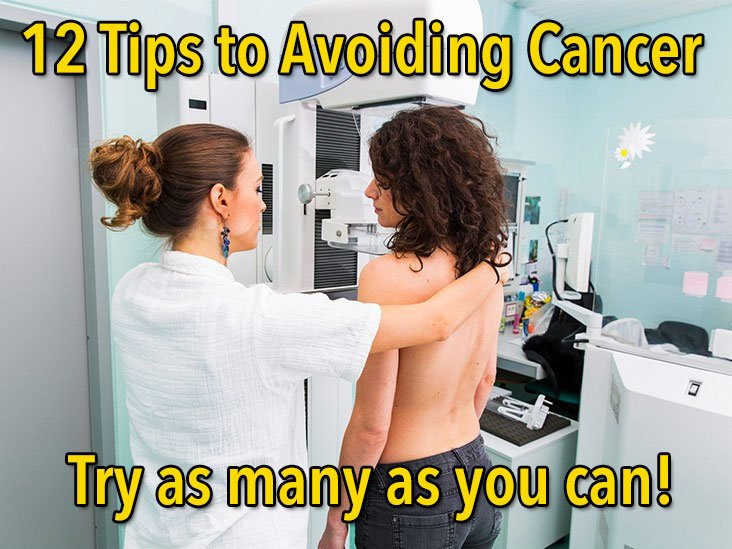
The 12 things you can do to avoid cancer
Or at least dramatically decrease your chances of getting it!
I think all of us have a relative or a close friend or two that have contracted some form of cancer or who have died from cancer in our lifetime.
I don’t propose to have the absolute answer or cure for cancer but I will go out on a limb and say that the following twelve tips will absolutely help you avoid it. The more of these you are able to incorporate into your life the better off you’ll be.
Please note that everything I recommend is backed by scientific research and my personal experience. I don’t propose that my recommendations are the conclusion of all discussions. It is simply 12 things I feel will help one be as healthy as they can and minimize their chances of getting cancer. There are probably 100 things you can do!
1. Eat a Healthy Plant-based Diet
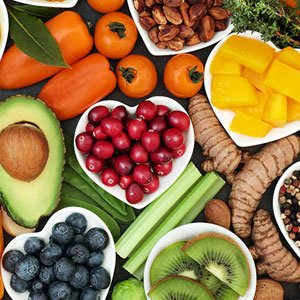 What you eat has a huge impact on your health. However, for most people that might mean feeling better or have more energy but diet has a much deeper impact on our longevity — what you eat can be the difference in dieing way before our allotted time or living a full and vibrant life. According to the World Health Organization, about one-third of all cancers can be prevented by factors within your control, including diet. For example, a plant-based (vegan) diet is richer in many essential nutrients, but fortifying the body against disease. It helps to keep our body at optimum weight and it is well documented that obesity is a leading factor of poor health. A plant-based diet can lower blood sugar levels and most importantly, it can protect us against certain forms of cancer.
What you eat has a huge impact on your health. However, for most people that might mean feeling better or have more energy but diet has a much deeper impact on our longevity — what you eat can be the difference in dieing way before our allotted time or living a full and vibrant life. According to the World Health Organization, about one-third of all cancers can be prevented by factors within your control, including diet. For example, a plant-based (vegan) diet is richer in many essential nutrients, but fortifying the body against disease. It helps to keep our body at optimum weight and it is well documented that obesity is a leading factor of poor health. A plant-based diet can lower blood sugar levels and most importantly, it can protect us against certain forms of cancer.
Source: 6 Science-based Health Benefits of a Vegan Diet
Source: A plant-based diet is a powerful way to achieve good health.
2. Avoid all Dairy
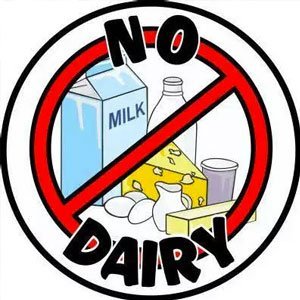 Dairy products have been linked to all kinds of chronic diseases, including cancer. Milk and other dairy products are the top sources of artery-clogging saturated fat, contributing to heart disease, type 2 diabetes, and Alzheimer’s disease. Studies have also linked dairy to an increased risk of breast and ovarian cancers. Contrary to dairy industry propaganda, dairy products and calcium do not prevent stress fractures and regular consumption of dairy products has been linked to prostate cancer.
Dairy products have been linked to all kinds of chronic diseases, including cancer. Milk and other dairy products are the top sources of artery-clogging saturated fat, contributing to heart disease, type 2 diabetes, and Alzheimer’s disease. Studies have also linked dairy to an increased risk of breast and ovarian cancers. Contrary to dairy industry propaganda, dairy products and calcium do not prevent stress fractures and regular consumption of dairy products has been linked to prostate cancer.
Proponents of India’s health system, Ayurveda will disagree with these conclusions but I want to draw their attention to the fact that the milk that is glorified in the ancient Ayurvedic texts is NOT anything like what is currently being sold in supermarket stores. Commercial dairy has none of the healing benefits that are mentioned in the Ayurvedic texts and should be avoided at all costs.
Source: The Dairy Debate
Source: The Health Concerns about Dairy
Please also read: https://www.pcrm.org/news/health-nutrition/dairy-products-and-ovarian-cancer
And: https://www.pcrm.org/news/blog/got-prostate-ditch-dairy
3. Connect with Nature
 We are nature — each one of us is an integral part of a perfectly balanced ecosystem and yet, for the most part, humans live disconnected from nature — in high rise apartments eating processed foods and drinking chlorinated water.
We are nature — each one of us is an integral part of a perfectly balanced ecosystem and yet, for the most part, humans live disconnected from nature — in high rise apartments eating processed foods and drinking chlorinated water.
A study conducted by the University of British Columbia examined the specific effect of immersion in nature upon the overall sense of well-being of participants and was published in the Journal of Positive Psychology.
Researchers divided people into three different groups. For one group, immersion in nature was defined as taking time to engage in some form of connection with the natural world, including not just walking in nature but anything not human-built: a houseplant, a dandelion growing in a crack in a sidewalk, birds, or exposing our body to the sun through a window.
One of the other two groups focused on their self-observations regarding human-made objects, and the third did neither. Researchers found that the difference in the participants’ well-being —their happiness, sense of elevation, and their level of connectedness to other people, not just nature — was significantly higher for the first group than that of participants in the group which noticed how only human-built objects made them feel. It was also higher than the control group, which did neither.
Source: Why Connecting with Nature Elevates your Mental Health
4. Minimize Electromagnetic Pollution
 The digital world we all relish and appreciate has its drawbacks — the electromagnetic pollution we are all being bombarded with is changing our physiology. The threat of numerous forms of electromagnetic fields (EMFs) to human health is becoming increasingly clear, and thanks to researchers like Camilla Rees, the dangers are beginning to permeate the mainstream media.
The digital world we all relish and appreciate has its drawbacks — the electromagnetic pollution we are all being bombarded with is changing our physiology. The threat of numerous forms of electromagnetic fields (EMFs) to human health is becoming increasingly clear, and thanks to researchers like Camilla Rees, the dangers are beginning to permeate the mainstream media.
B. Blake Levitt, Former New York Times writer and author of Electromagnetic Fields, A Consumer’s Guide to the Issues and How to Protect Ourselves, and Editor of Cell Towers, Wireless Convenience? Or Environmental Hazard? explains in Rees’ book, Public Health SOS: The Shadow Side of the Wireless Revolution that:
“… It turns out that most living things are fantastically sensitive to vanishingly small EMF exposures. Living cells interpret such exposures as part of our normal cellular activities (think heartbeats, brainwaves, cell division itself, etc.) The problem is, man-made electromagnetic exposures aren’t “normal”. They are artificial artifacts, with unusual intensities, signaling characteristics, pulsing patterns, and wave forms. And they can misdirect cells in myriad ways.”
One practical way to reduce electromagnetic pollution is to practice grounding or earthing.
Source: What is the Best Way to Distress?
Source: Grounding the Human Body: The Healing Benefits of Earthing
Source: An Activists Journey to Raise Awareness of Electromagnetic Pollution
5. Keep your Blood Alkaline
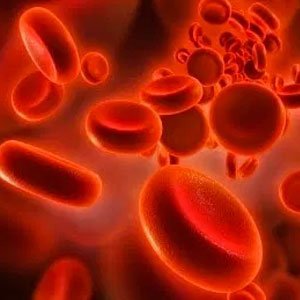 One of the two leading factors of disease is acidic blood, the other is lack of oxygen. The kind of food we eat certainly changes the pH of our blood and so too does our lifestyle.
One of the two leading factors of disease is acidic blood, the other is lack of oxygen. The kind of food we eat certainly changes the pH of our blood and so too does our lifestyle.
When your body fluids contain too much acid, it’s known as acidosis. Acidosis occurs when your kidneys and lungs can’t keep your body’s pH in balance. Many of the body’s processes produce acid. Acidosis can lead to numerous health issues, and it can even be life-threatening.
Nearly all biological functions are dependent upon the acidity or alkalinity of the liquid environment. pH is a measure of the relative acidity or alkalinity of a solution where a pH of 7 is neutral, less than 7 is acidic and greater than 7 is alkaline or basic. A pH of 7.35 – 7.45 is ideal.
Foods that increase the acidity of our blood include meat, fish, dairy and alcohol. Food that increases the alkalinity of our blood includes green leafy vegetables, fruits, and fermented foods.
By eating a plant-based, alkaline diet it easier for the body to maintain that ideal number. If one ate only meat, fish, eggs, sugar and processed foods and drank lots of alcohol then the body would struggle to maintain that ideal number.
Source: Acidosis
Source: Diseases Caused by Alkaline or Acid pH in the body
Source: Acid/Base Balance
6. Keep a Positive Attitude
 All disease begins in the mind.
All disease begins in the mind.
When a person is depressed, the whole body is negatively impacted. Depressed people get ill easier and the road to recovery is more challenging. People who are happier and more positive are typically better able to fend off diseases and enjoy better health during chronic illness.
Everyone feels sad once in a while but depression can sap the life out of you and often leave you feeling helpless and weak. When depressed we often lose interest in normal activities such as eating, making love, and decision making, and our sleeping patterns are disrupted. We may feel tired, irritable, or lethargic most of the time; or think continually about death or suicide.
The National Institute on Aging shook up the medical world with the results of a remarkable study: Tracking 4,825 people ages 71 and older, researchers found that those who were chronically depressed for at least six years had an 88 percent greater risk of developing cancer within the next four years. The researchers speculated that depression fuels cancer by damaging T-cells and other parts of the body that fight the disease. (Of course, both cancer and chemotherapy may have biochemical effects that contribute to depression as well.)
Even before doctors had any inkling that mood could affect a person’s chances of getting cancer, it was already clear that depression and loneliness added to the devastation of the disease once it was present. Cancer patients without strong social ties are particularly likely to die early, and patients who get counseling and support may add years to their lives: One study of women with advanced breast cancer found that those who attended weekly support groups lived an average of 18 months longer than those who didn’t. Although later studies did not find the same benefit, doctors agree that support groups can increase your quality of life. Weighted blankets have also been proven to help with depression.
“Cancer survivors who are depressed are twice as likely to die prematurely as those who are not depressed” -Journal of Cancer Survivorship
Just last month, the British Journal of Medicine (BJM) published the findings of 16 cohort studies conducted in England and Scotland over a 14 year period, that examined the role of psychological distress as a predictor of mortality in cancer patients. Based on self-reports of over 160,000 men and women, those with higher levels of distress had a 32% greater risk of total cancer mortality, specifically those reporting symptoms of depression and anxiety. These findings, the Journal reports, contribute to the growing evidence of the link between psychological factors and cancer survival.
Source: Illness: the mind-body connection
Source: Neglecting Mental Health in Cancer Treatment
Source: Awareness, Diagnosis and Treatment of Depression
7. Breathe
 The science of breathing stands on quite ancient foundations. Centuries of wisdom instructs us to pay closer attention to our breathing, the most basic of things we do each day. And yet, maybe because breathing is so basic, it’s also easy to ignore. A brief review of the latest science on breathing and the brain, and overall health serves as a reminder that breathing deserves much closer attention – there’s more going on with each breath than we realize.
The science of breathing stands on quite ancient foundations. Centuries of wisdom instructs us to pay closer attention to our breathing, the most basic of things we do each day. And yet, maybe because breathing is so basic, it’s also easy to ignore. A brief review of the latest science on breathing and the brain, and overall health serves as a reminder that breathing deserves much closer attention – there’s more going on with each breath than we realize.
Controlling your breathing calms your brain and regulates your blood pressure. According to the ancient yoga teachings of India, at the time of our birth, we are allotted a certain amount of breaths for this life, so it follows then, that slowing down our breathing will increase our lifespan.
In yoga we learn to control prana, the vital force, through pranayama. We use the breath in pranayama to learn to control prana, but don’t confuse prana with breath. Prana is the energy that animates the lungs. It is NOT the breath. Using the breath is the easiest method for training prana. Once you are able to control prana through pranayama you are better able to control the movement of prana to other organs and areas of the body. – Amarajit Singh
In the 1930s, Nobel Prize winner Dr. Otto Warburg hypothesized,
“Cancer has only one prime cause. The prime cause of cancer is the replacement of normal oxygen respiration of body cells by an anaerobic (oxygen-less) cell respiration.”
He believed that cancer cells thrive in oxygen-poor environments and many research studies now support his assertion. Thanks to Warburg and others, we know that cancer cells metabolize differently than normal cells, which need oxygen for respiration. Instead, cancer cells metabolize through the process of fermentation. This inferior form of energy production is activated when the oxygen level of a cell drops below 40 percent. This leads to an acidic environment that encourages the growth of cancer cells.
It goes without saying that to get the full benefits of breathing practice, we should avoid smoking and also breathing in secondhand smoke. According to the CDC, “Secondhand smoke is the combination of smoke from the burning end of a cigarette and the smoke breathed out by smokers. Secondhand smoke contains more than 7,000 chemicals. Hundreds are toxic and about 70 can cause cancer. Since the 1964 Surgeon General’s Report, 2.5 million adults who were nonsmokers died because they breathed secondhand smoke.“
Source: How Breathing Calms Your Brain, And Other Science-Based Benefits Of Controlled Breathing
Source: Breathing Techniques for Stress-Relief
Source: Health Effects of Secondhand Smoke
Source: Why is Breath So Important in Yoga?
Source: Can Deep Breathing Be Key to Cancer Healing? You Bet!
8. Get Sunlight
 Contrary to popular belief, the sun is not our enemy. In fact, sunlight is critical for our health, most significantly in helping our body produce Vitamin D. Although excess sunlight can contribute to skin cancers, a moderate amount of sunlight actually has preventive benefits when it comes to cancer.
Contrary to popular belief, the sun is not our enemy. In fact, sunlight is critical for our health, most significantly in helping our body produce Vitamin D. Although excess sunlight can contribute to skin cancers, a moderate amount of sunlight actually has preventive benefits when it comes to cancer.
Decreased sun exposure has been associated with a drop in your serotonin levels, which can lead to major depression with seasonal changes. The light-induced effects of serotonin are triggered by sunlight that goes in through the eye. Sunlight cues special areas in the retina, which triggers the release of serotonin. So, you’re more likely to experience this type of depression in the wintertime, when the days are shorter.
Due to this connection, one of the main treatments for depression with seasonal changes is light therapy, also known as phototherapy. You can get a light therapy box to have at home. The light from the box mimics natural sunlight that stimulates the brain to make serotonin and reduces excess melatonin.
Source: What are the Benefits of Sunlight?
Source: Welcome the Sun back into your life!
Source: https://luxeluminous.com/benefits-of-tanning/
9. Eat Fermented Foods
 Our body has more bacteria living inside than all the cells that make up the human form. At any one time, we have about 3 pounds of bacteria living inside of us. A healthy body is one that has more good bacteria than bad bacteria. Our gut is the foundation of our organism. It is where we absorb our nutrition and from where we interface with the exterior world even more intimately than through our skin. If you want to get to the bottom of an ailment, you need to look at how your digestion is working, and what you are eating.
Our body has more bacteria living inside than all the cells that make up the human form. At any one time, we have about 3 pounds of bacteria living inside of us. A healthy body is one that has more good bacteria than bad bacteria. Our gut is the foundation of our organism. It is where we absorb our nutrition and from where we interface with the exterior world even more intimately than through our skin. If you want to get to the bottom of an ailment, you need to look at how your digestion is working, and what you are eating.
The four main nutrients needed for optimal digestion are enzymes, prebiotics, probiotics, and minerals.
Minerals activate enzymes that accelerate the chemical reactions of metabolism. Enzymes are there to break down food into less complex parts for better assimilation.
Prebiotics are food for your microbiome. The best prebiotics is found in raw fibrous fruits and veggies, especially raw, leafy, greens, and soluble and insoluble fiber found in produce.
Probiotics are most often found in fermented food like raw sauerkraut, kimchi, and other products (like live pickles). Probiotic foods also have digestive enzymes.
The Greek physician Hippocrates often referred to as “the founder of modern medicine,” said, “All disease begins in the gut.” The flip-side of that coin is also true! All health begins in the gut.
10. Meditate
 Since a good supply of oxygen to the blood and a healthy mind is critical to health, it is not surprising that yoga, tai chi, and meditation have lasted the test of time. Incorporating a deep breathing and meditation routine into your life has been proven beyond a doubt to be great for our overall mind/body/spirit health.
Since a good supply of oxygen to the blood and a healthy mind is critical to health, it is not surprising that yoga, tai chi, and meditation have lasted the test of time. Incorporating a deep breathing and meditation routine into your life has been proven beyond a doubt to be great for our overall mind/body/spirit health.
Science has proven that even the most basic meditation practice can reduce stress, control anxiety increase memory, improve attention span and self-awareness, improve the quality of our sleep and most importantly, reduce blood pressure.
As a monk, I would practice a form of mantra meditation for at least 2-hours daily and I found it to be tremendously helpful in reducing my stress and calming the mind. I was also celibate then, and meditation helped me maintain my vows.
Here is a collection of stories and comments people have sent to the researcher, Katie Holmes on the wonderful benefits meditation has brought them, published with the hope of inspiring YOU to try meditation for the first time (or pick it up again if you’ve just been lazy with it.
Benefits of Meditation: 38+ People Comment On The Benefits Meditation Has Brought Them
Source: 12 Science-based Benefits of Meditation
11. Intermittent Fasting
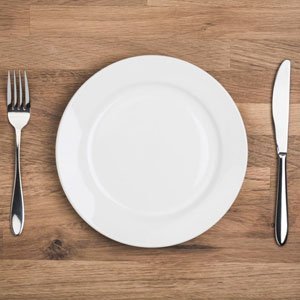 Intermittent fasting involves cycling between periods of eating and fasting, ranging from a few hours to a few days at a time. It is the kind of fasting I prefer because it does not disrupt your usual routines like a full-on fast would do. Fasting is not a new concept, it is a practice that dates back centuries and plays a central role in many cultures and religions. Fasting is a practice that has been associated with a wide array of potential health benefits, including weight loss, as well as improved blood sugar control, heart health, brain function, and cancer prevention.
Intermittent fasting involves cycling between periods of eating and fasting, ranging from a few hours to a few days at a time. It is the kind of fasting I prefer because it does not disrupt your usual routines like a full-on fast would do. Fasting is not a new concept, it is a practice that dates back centuries and plays a central role in many cultures and religions. Fasting is a practice that has been associated with a wide array of potential health benefits, including weight loss, as well as improved blood sugar control, heart health, brain function, and cancer prevention.
In India’s Ayurvedic tradition, fasting is considered to be a cure for all diseases!
Several studies have found that fasting may improve blood sugar control, which could be especially useful for those at risk of diabetes. Intermittent fasting and alternate-day fasting could help decrease blood sugar levels and reduce insulin resistance but may affect men and women differently.
Research shows that inflammation may be involved in the development of chronic conditions, such as heart disease, cancer, and rheumatoid arthritis (4). Some studies have found that fasting can help decrease levels of inflammation and help promote better health.
Animal and test-tube studies indicate that fasting may benefit the treatment and prevention of cancer. Similarly, a test-tube study showed that exposing cancer cells to several cycles of fasting was as effective as chemotherapy in delaying tumor growth and increased the effectiveness of chemotherapy drugs on cancer formation (32).
I do intermittent fasting every day by simply refraining from eating after 8 pm and then not eating my breakfast until 10:30 which means I have fasted for 14.5 hours!
Source: 8 Health Benefits of Fasting, Backed by Science
12. Sleep Well
 It is often believed that diet and exercise are the foundations of good health but according to Sleep Diplomat, Dr. Matt Walker, sleep is the real foundation and diet and exercise are the pillars.
It is often believed that diet and exercise are the foundations of good health but according to Sleep Diplomat, Dr. Matt Walker, sleep is the real foundation and diet and exercise are the pillars.
Sleep is one of the most important but least understood aspects of our life, wellness, and longevity. Until very recently, science had no answer to the question of why we sleep, or what good it served, or why we suffer such devastating health consequences when we don’t sleep. Compared to the other basic drives in life—eating, drinking, and reproducing—the purpose of sleep remained elusive.
Walker has spent the last four and a half years writing Why We Sleep, a complex but urgent book that examines the effects of this epidemic close up, the idea being that once people know of the powerful links between sleep loss and, among other things, Alzheimer’s disease, cancer, diabetes, obesity, and poor mental health, they will try harder to get the recommended eight hours a night.
There is some evidence of a link between insufficient sleep and the risk of cancer. In particular, people with circadian rhythm disorders—in which the body’s biological clock is disrupted because of shift work, for example—may be at increased risk. A study in the International Journal of Cancer found a relationship between women’s irregular work schedules and the rate of breast cancer. Researchers compared 1200 women who had developed breast cancer between 2005 and 2008, with 1300 women who did not have a cancer diagnosis. They found that the rate of breast cancer was 30 percent higher for the women who had worked shifts. Women who had at least four years of night shift work, as well as those with fewer than three night shifts per week (keeping them from ever fully adjusting to one schedule) were at highest risk. Shift work has also been shown to increase the incidence of certain cancers—for example prostate cancer—in men.
Source: Lack of Sleep Increases Your Risk of Some Cancers
I hope these 12 tips are helpful. If you are currently struggling with cancer or have fears of contracting it, please try to incorporate some or all of the above suggestions into your life.
Some other sources
Wishing you the best of health and happiness!
Paul Rodney Turner, the Food Yogi